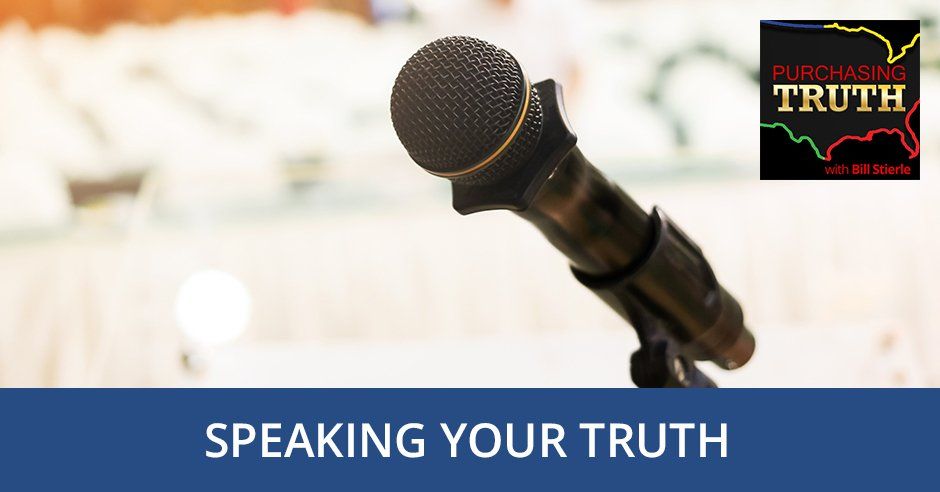Speaking Your Truth
Subscribe Today!
Words make a difference. Whether it’s an impeachment piece, a Quid Pro Quo, or a town hall that the Congresspeople or senators are holding, it makes a big difference that you pick words that are going to make a difference. In this episode, hosts Bill Stierle and Tom talks about the importance of speaking your truth and putting aside some of the bias. Tackling the impeachment vote on Trump, they cite Michigan Representative Elissa Slotkin’s vote on impeachment and how she communicated to her district why she had decided to vote for impeaching the president. Communication skills are indeed crucial because certain vibration of words resonate differently with different people.
Watch the episode here
We have received communication from our audience. I am so excited about that. We should invite more of our audience to engage with us. I’m excited for you to share with us this excerpt at least from this email. We should talk about it.
One of the delightful things, when we do get feedback from this show, is that we get some ways that we can go into certain areas that will help the audience get a greater ability to shift their communication in order to be more effective. One of the things that the audience wrote was if we took some time to teach the audience how to dismantle a belief system that they might have or even what the other person might have so we can hear the truth more effectively. That was one of his recommendations. We haven’t received any negative-negative feedback saying, “What you’re talking about truth and language isn’t true,” because that one would be not true.
It would be troubling because words make a difference in the words. One of the things we talked about last time is the vibration of words. If you call somebody an idiot, are they going to be more receptive to the next thing you say? The vibration of the word, idiot or stupid, as well as many other words, will tend not to get people to listen to you. If we use and replace the word, idiot or stupid, with the word, awareness, the chances of the person tuning in to us and shifting their awareness to at least consider your awareness of the offering that you offered, things will tend to go better. Rather than saying, “That idea is stupid,” “Let me see if I am clear about the awareness that you have about this. This is the awareness that I have about it.” All of a sudden, at least you’re in some dialogue versus a monologue of labels and diagnoses. Whether it’s an impeachment piece, a quid pro quo or whether it’s a town hall that the congresspeople are holding or senators hold, it makes a big difference that you pick words that are going to make a difference.
Maybe we should also acknowledge the reality that each of us, including you and me, have our own perspectives and our own inherent biases. Everybody on earth has them to a degree. Hopefully, people have more awareness of their biases because that’s helpful, but we don’t always. I want to make a brief statement here that we’re trying to look at things from all sides despite our own perspectives. Sometimes we may succeed more than others at other times. That’s our goal. We call out Republicans in this show for their tragic use of language or their distance away from the truth as much as we do Democrats. There’s a lot more to talk about with the president. Volume has turned up there.
We have done an episode on the truth scale, the seven steps away from the truth. To take a moment to remind this audience is that it’s not fully on the truth, but the closest that you can be to the truth is the language of observation. As soon as you move to evaluation, even you and I are talking, we’ve drifted into the evaluation, we move away from truth a little bit. Observation is what the person is seeing. The simple example of a color-blind person that does not see the color green. The color green changes to the color gray for them because my dad was that guy.
I go, “Dad, you can’t see the green light?” He goes, “No, I can’t see that the color is green because it looks gray to me.” I go, “How do you know what green looks like when you’ve never seen green?” Once we got him those glasses that we’re able to change things. He was able to see that’s what the world looks like to everyone else. The power of observation and getting a person into a place of observation is significant. It is very valuable and appreciates that a person can’t see anything. Tom, if you’re brought up in a Muslim country where the religion and everyone around you are thinking in that belief structure of Islam and thinking that way. You go to another place that the entire culture is Hindu.
The belief structures are sitting away in different places with an entire range of behaviors. When it comes to politics and voting, if you’re staying inside your bubble, you’re going to keep seeing the bubble. You’re only going to see the people that are talking in your environment. If you only go to one church, you’re only going to see and resonate with the church, the people in that church and the people who believe the things that they do in that church. That’s going to influence the truth.
If we’re to pick up at the place of observation, it allows us to become more objective. As soon as we move down towards judgment of right or wrong, we move away from the truth. A bias allows us to stand in a certain place. A belief bias gives us a form of certainty. It’s not true, but it is certain for us. If I have a belief about the shape of the world, whether it’s flat or round, notice when I said whether it’s flat or round, that puts it as an equal observation. Those two things are not equal because we don’t have an equal number of pictures of a flat earth. We don’t have that. As soon as it’s whether/or, our brain makes those two things 50/50.
It puts our brand in the condition to think that it might be flat.
When there’s a hijacking, because it literally is like people trying to get people to believe in a certain way or to vote in a certain way, what winds up happening is that we get away from common needs such as truth, integrity, fairness or what justice looks like because we start globalizing and making things false equivalency. The brain creates a false equivalency once you put one thing next to each other and it says whether it can be, the brain makes them buzz even. They’re not even. This has a bunch of evidence and this has this evidence. Here’s the fact over here. These are the people that study this.
This is what we saw certain people doing, especially Attorney General William Barr. He put surveillance with a warrant next to spying. He was trying to make them appear to be the same thing. Everybody, especially on the right side of the political spectrum, started calling what the FBI was doing. We’ve had a report that came out that said at least that the investigation was started with integrity. It was not politically motivated. Mistakes were made. We need to acknowledge that along the way for sure. Certainly, the FBI was not spying on people. Spying is usually CIA doing something maybe in another country, some other surveillance or certainly people who are not in the government do.
It’s looking into people’s privacy without the legal approval of the court system, which protects those people from being looked at. It’s not that in the world that there aren’t people trying to find information without any legal evidence to go find that information. There are companies that spy on other companies. They do that as a part of the competitive environment. There are individuals that go look for evidence that even though it’s been disproved. They’re not interested in the evidence. They’re interested in the potential of they are trained to hijack that there might be the possibility that this thing might be there. They want the confused person to stay confused and become more confused and make it that this person can’t be trusted because of this thing.
Spying is commonly thought of as bad. Therefore, surveillance must be bad. We’re not even going to call it surveillance anymore.
We’re going to label it spying.
Surveillance is a legal function. Spying is an illegal function from the court of law perspective. Spy on people unless there is a probable cause. There is founded piece of information that says, “You’ve got to look here because there’s something on over here.”
It’s justified in a legal sense.
If the bias is creating certainty and we want to stay with certainty, another person might have the opposite bias. For example, in a town hall, we’ve been seeing different representatives go out to different town halls. They’ll go out and talk to the constituents.
Regrettably, they don’t have the level of communication skills I would like them to have. They would draw the bias out first rather than trying to promote their bias. If I was facilitating, coaching or providing consulting to a candidate, it would sound like welcome the illusion that the person has in their brain. That illusion that has a piece of bias that needs to be cleaned up and in high conflict mediation, I am pulling that stuff forward to me. I am not trying to talk over or trying to prove a bias wrong.
I want to bring a real example to this. Prior to the vote on impeachment, Michigan Representative Elissa Slotkin had a town hall in Rochester, Michigan which was in her district. She won in 2018, one district that flipped from a Republican representative to a Democratic representative. She had a town hall to communicate to her district why she had decided to vote for impeaching the president when she had been very much against it. People were talking about it and the context of the Muller report. She didn’t come to Congress to impeach the president. She came to get things done for her district. She’s gotten to the point where she is voting for impeachment and did. She wanted to explain it.
She had a town hall full of as many supporters of Donald Trump as people who are not. I want to acknowledge the integrity that it took to stand up and say, “Here’s what I see. The evidence is undeniable and I have to vote my conscience and support the Constitution because that’s the oath I took. I need to vote to impeach the president.” What she did not do is what you’re suggesting, Bill. What could she have done to draw it out and have communicated more effectively that might have those people in the audience who were thinking that she was making the wrong decision? Maybe put aside some of their bias and approach it differently.
There’s a practical thing to do. With some skill and some training, she could invite a person that would like to speak on behalf of the president and have that person sit on stage with her, have a discussion and pull out the person’s belief about how important their vote was for this president. As well as some of their other beliefs that are holding that belief in place, which is the belief that they’re not giving them a chance. They’re not doing the things he would like to get done. They have a lot of pain about the things that they would like to get done that they think that Donald Trump is going to help get done.
What winds up happening in that dialogue is that the person that is in the red hat will be talking about the pain that they’re having and that they lost the job. The pain that they had regarding the medical issue that they have that they thought that Donald Trump was going to do something about it. The pain that they have about what somebody said regarding a non-conservative value that they have some pain about that. The impeachment vote gives a lightning rod to all of those pains and they say, “I voted for this guy. I want him to do the things that he said he was going to do.” Candidates get to promise anything they want. Sometimes the candidates promise things that are outside the legal ability for them to do.
There's a hijacking when people are trying to get people to believe in a certain way or to vote in a certain way.
CLICK TO TWEET
I would have phrased that thing that you said instead of, “I understand.” This is the communication nuance that I get into and saying. I’m pretending I’m here. There are many people in this audience that would fully like me to hear that we should not be spending our time on this impeachment. Do I have that correct? A group of people in the audience would applaud. All of a sudden, at least you heard them. You come back around and say the next sentence, which is, “We want to make sure in the United States that every vote counts. Your vote that voted for Donald Trump counted too. We want to validate that vote.” Am I hearing that second part right? Yes. I’ve got my second set of applause.
The other side is going to be unsettled as crap, that’s up to them. There are other people in the room that would not have voted for the president. I have the great fortune to sit here in front of you to be able to support both of you to get something done. One of the biggest challenges that I face in the integrity I have to do as your representative is when I take that oath, I have to take that oath to this sentence over here. She reads off the Constitution. You can’t take money from a foreign power. You can’t use any money. There have been many mistakes that President Donald Trump has made that I would’ve preferred him not to make. There were many choices that he has made that I would prefer him not to make those choices. This one choice that he made is something that is against the oath that I took.
It jeopardizes the vote that you cast towards him because you saw him as a changemaker. He has changed things. Some people would argue for the better and some people would argue for the worsts your representative, I got to follow that thing that the founders wrote in order to be in integrity. If I vote no, I am not in integrity with what the founders wrote because here is this strategy that he took. We could talk about the motive of the strategy that he heard or he has some information that none of us have that there is some corruption with the Bidens. “You would like me to hear that, is that correct with anybody?” “Yes. I would like to hear more about that.” That’s an important thing to hear about if we had more truth around that. As well as if we haven’t spent time and energy investigating that already because there has been time and energy spent on that already. They didn’t find what the president has claimed that is there. We do have what the president was looking for was the possibility of a problem, which has been created. That is not in alignment with the integrity of the Constitution.
That would be a much more effective way for her to have communicated with that audience and probably gotten, if not everybody in the audience on her side. At least saying, “She’s a person of integrity. She’s smart.” I’m not going to rake over the calls for this vote to impeach.
At least I have a new certainty that this person is being thoughtful. If I would have heard, I would have said, “There was some other evidence in the Mueller Report that showed that there was some obstruction.” I was willing to let those things pass because I was interested in the votes of your vote towards Donald Trump. This one, it’s so clear that this is something that I can’t look away from.
This one crossed the line. That’s what she did in the town hall. She talked about what the tipping point for her was and that there was a problem and a violation of the Constitution that she could not let go. She went into the place that we see most often of explanation of why she voted the way she did. Rather than show empathy and compassion for others that are thinking that she might have made the wrong vote and helping them to realize what she did is in alignment with supporting the Constitution and they should all want her to support the Constitution. It would’ve been a very different experience. These politicians get elected despite their communication skills.
This is why most people stay at home because there’s not an inspiration from the inside. There’s the dangling of possibility from the outside. Most people go like, “You’re dangling the possibility, but I’m not believing that you can do it because you don’t have the leadership and communication skills. All you have is your name on a sign. You have enough money to stick it around on our lawns.” It’s very challenging.
Mike Bloomberg has put $30 million into essentially putting signs on lawns. Those lawns are our television screens, cell phones, on social media and all that. It would be interesting to see how effective that is.
It’s going to be interesting to see how that works. He does have a great sense of focus. He has a quality of decision making that has made him very successful. Creating the internal motivation to get people to extend trust in his direction will be very interesting to see how that works. More to come on this, Tom. This has been a great discussion. I want to thank the person who wrote about dismantling belief structures so that they can know the truth because biases create certainties. Your bias and my bias create a certainty that allows us to wake up in the morning and make decisions during the day, but it doesn’t necessarily mean they’re all the right ones.
I do appreciate the person that wrote in as well. I would encourage other audience to write in. You can help shape some of this discussion that we have. I like how you were able to use the town hall with Representative Elissa Slotkin to show about. Maybe it wasn’t breaking beliefs as much in that situation as it was showing empathy and compassion, which allows people to feel a little more comfortable and open their minds to be able to hear the truth.
It allows that opportunity. Tom, until our next one. I’m looking forward to pick this up and feel free to reach out for those of you out there.
Thanks very much.
Love the show? Subscribe, rate, review, and share!








